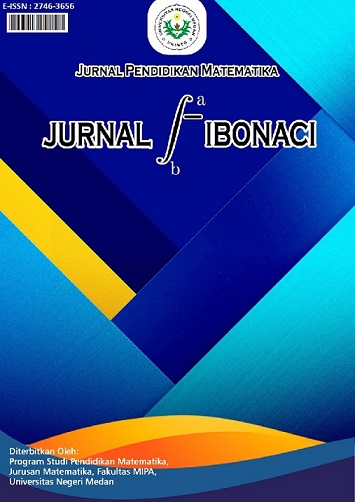Pengembangan E-modul Dengan Pendekatan Contextual Teaching and Learning (CTL) Pada Siswa SMP
DOI:
https://doi.org/10.24114/jfi.v5i2.64434Abstract
Penelitian ini bertujuan untuk menghasilkan e-modul matematika dengan pendekatan Contextual Teaching and Learning (CTL) pada siswa SMP yang valid, praktis, dan memiliki efek potensial. Proses pengembangan ini menggunakan metode pengembangan 4D yang terdiri dari beberapa tahapan yakni: define, design, development, dan disseminate. Metode pengumpulan data terdiri dari observasi, wawancara, angket (kuesioner), dan tes dengan subjek 30 peserta didik. Berdasarkan hasil analisis data pengembangan e-modul dengan pendekatan Contextual Teaching and Learning (CTL) menunjukkan nilai Aiken’s V dari tiga ahli validator yakni ahli bahasa 0,85, ahli media 0,92, serta ahli materi 0,88 dengan tingakatan sangat valid. Pada uji kepraktisan guru dan peserta didik mendapatkan total skor 84,75% dengan tingkatan sangat praktis. Sementara efek potensial e-modul terhadap hasil belajar 30 peserta didik melalui tes didapatkan data bahwa 26 peserta didik (86,67 %) tuntas dan 4 peserta didik (13,33%) belum tuntasDownloads
Published
2024-12-26
Issue
Section
Articles
License

This work is licensed under a Creative Commons Attribution-NonCommercial-ShareAlike 4.0 International License.
Authors who publish articles in this journal agree to the following terms:
- Authors retain copyright of the article and grant the journal right of first publication with the work simultaneously licensed under a CC-BY-SA or The Creative Commons Attribution–ShareAlike License.
- Authors are able to enter into separate, additional contractual arrangements for the non-exclusive distribution of the journal's published version of the work (e.g., post it to an institutional repository or publish it in a book), with an acknowledgment of its initial publication in this journal.
- Authors are permitted and encouraged to post their work online (e.g., in institutional repositories or on their website) prior to and during the submission process, as it can lead to productive exchanges, as well as earlier and greater citation of published work (See The Effect of Open Access).



